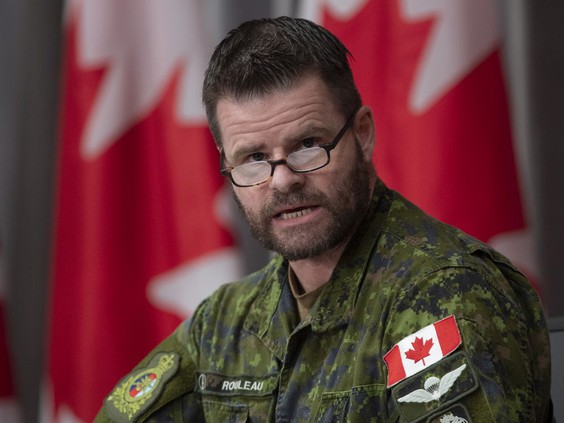David Pugliese
September 27, 2021
-Ottawa Citizen
Canadian military leaders saw the pandemic as a unique opportunity to test out propaganda techniques on an unsuspecting public, a newly released Canadian Forces report concludes.
The federal government never asked for the so-called information operations campaign, nor did cabinet authorize the initiative developed during the COVID-19 pandemic by the Canadian Joint Operations Command, then headed by Lt.-Gen. Mike Rouleau.
But military commanders believed they didn’t need to get approval from higher authorities to develop and proceed with their plan, retired Maj.-Gen. Daniel Gosselin, who was brought in to investigate the scheme, concluded in his report.
The propaganda plan was developed and put in place in April 2020 even though the Canadian Forces had already acknowledged that “information operations and targeting policies and doctrines are aimed at adversaries and have a limited application in a domestic concept.”
The plan devised by the Canadian Joint Operations Command, also known as CJOC, relied on propaganda techniques similar to those employed during the Afghanistan war. The campaign called for “shaping” and “exploiting” information. CJOC claimed the information operations scheme was needed to head off civil disobedience by Canadians during the coronavirus pandemic and to bolster government messages about the pandemic.
A separate initiative, not linked to the CJOC plan, but overseen by Canadian Forces intelligence officers, culled information from public social media accounts in Ontario. Data was also compiled on peaceful Black Lives Matter gatherings and BLM leaders. Senior military officers claimed that information was needed to ensure the success of Operation Laser, the Canadian Forces mission to help out in long-term care homes hit by COVID-19 and to aid in the distribution of vaccines in some northern communities.
Then chief of the defence Staff Gen. Jon Vance shut down the CJOC propaganda initiative after a number of his advisers questioned the legality and ethics behind the plan. Vance then brought in Gosselin to examine how CJOC was able to develop and launch the propaganda operation without approval.
Gosselin’s investigation discovered the plan wasn’t simply the idea of “passionate” military propaganda specialists, but support for the use of such information operations was “clearly a mindset that permeated the thinking at many levels of CJOC.” Those in the command saw the pandemic as a “unique opportunity” to test out such techniques on Canadians.
The views put forth by Rear Adm. Brian Santarpia, then CJOC’s chief of staff, summed up the command’s attitude, Gosselin noted in his report. “This is really a learning opportunity for all of us and a chance to start getting information operations into our (CAF-DND) routine,” the rear admiral stated.
The command saw the military’s pandemic response “as an opportunity to monitor and collect public information in order to enhance awareness for better command decision making,” Gosselin determined.
Gosselin also pointed out CJOC staff had a “palpable dismissive attitude” toward the advice and concerns raised by other military leaders.
The directive for the propaganda plan was issued by CJOC on April 8, 2020, but it took until May 2 of that year before Vance’s order to shut it down took effect.
Gosselin recommended a comprehensive review of Canadian Forces information operations policies and directives, particularly those that may impact any activities for domestic missions.
There is an ongoing debate inside national defence headquarters in Ottawa about the use of information operations techniques. Some public affairs officers, intelligence specialists and senior planners want to expand the scope of such methods in Canada to allow them to better control and shape government information that the public receives. Others inside headquarters worry that such operations could lead to abuses, including having military staff intentionally mislead the Canadian public or taking measures to target opposition MPs or those who criticize government or military policy.
Military propaganda training and initiatives within Canada over the last year have proved to be controversial.
The Canadian Forces had to launch an investigation after a September 2020 incident when military information operations staff forged a letter from the Nova Scotia government warning about wolves on the loose in a particular region of the province. The letter was inadvertently distributed to residents, prompting panicked calls to Nova Scotia officials who were unaware the military was behind the deception. The investigation determined the reservists conducting the operation lacked formal training and policies governing the use of propaganda techniques were not well understood by the soldiers.
Yet another review centred on the Canadian Forces public affairs branch and its activities. Last year, the branch launched a controversial plan that would have allowed military public affairs officers to use propaganda to change attitudes and behaviours of Canadians as well as to collect and analyze information from public social media accounts.
The plan would have seen staff move from traditional government methods of communicating with the public to a more aggressive strategy of using information warfare and influence tactics on Canadians. Included among those tactics was the use of friendly defence analysts and retired generals to push military PR messages and to criticize on social media those who raised questions about military spending and accountability.
The Canadian Forces also spent more than $1 million to train public affairs officers on behaviour modification techniques of the same sort used by the parent firm of Cambridge Analytica, the company implicated in a 2016 data-mining scandal to help Donald Trump’s U.S. presidential election campaign.
The initiative to change military public affairs strategy was abruptly shut down in November after this newspaper revealed details about the plan. A military investigation determined what the Canadian Forces public affairs leadership was doing was “incompatible with Government of Canada Communications Policy (and the) mission and principles of Public Affairs.” None of the public affairs leadership was disciplined for their actions.
Several months ago, Acting Chief of the Defence Staff Gen. Wayne Eyre and DND deputy minister Jody Thomas acknowledged in an internal document that the various propaganda initiatives had gotten out of control. “Errors conducted during domestic operations and training, and sometimes insular mindsets at various echelons, have eroded public confidence in the institution,” noted a June 9, 2021, message signed by Eyre and Thomas. “This included the conduct of IO (Information Operations) on a domestic operation without explicit CDS/DM direction or authority to do so, as well as the unsanctioned production of reports that appeared to be aimed at monitoring the activities of Canadians.”




